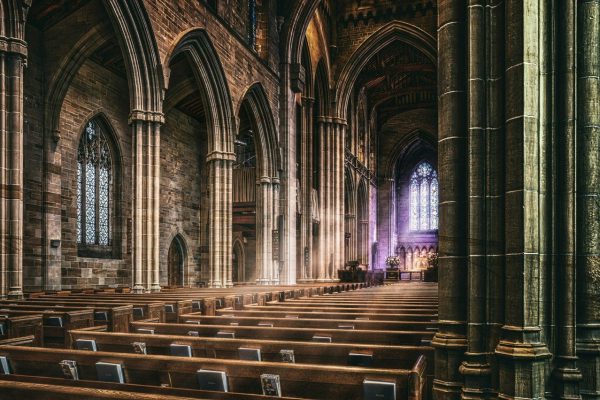This paper on the destruction of Jerusalem and the vindication of Jesus was originally delivered to the Reformation Society of Western New York on February 8, 2024. For readablity, it has been converted into a series of articles. A PDF version is available.
Introduction
Part 1 | Judgment on God’s House: A Central Theme of the Prophets
Part 2 | The Final Verdict: Judgment for Israel and Vindication for the Son of Man
Part 3 | AD 70 as a Sign of “The End”
Concluding Implications
In this section, my argument is that the destruction of Jerusalem and its temple in AD 70 is a theologically significant event because it serves as God’s “final verdict” on Israel and Jesus. For Israel, this event was the culmination of God’s judgment for their rejection of the Son. For Jesus, it was part of his vindication as the Son of Man along with his resurrection. This will be established through key NT passages conveying the fulfillment and finality of judgment.
AD 70 as the Culmination of God’s Judgment on Israel
Several passages in the NT attest to Israel’s unbelief being fulfilled or completed in their rejection of Jesus. The first instance comes in the explanation of the parable of the sower (Matt. 13:10-17). Jesus quotes Isaiah 6:9-10 to describe Israel’s failure to respond to his message. The introductory phrase is striking: “Indeed, in their case the prophecy of Isaiah is fulfilled” (Matt. 13:14). In its original context, Isaiah 6:9-10 was not about the future but Isaiah’s own experience. However, the unbelief of Israel in Isaiah’s day came to its fullest expression in Jesus’ ministry with “this generation.” France explains that “[Isaiah’s] experience formed a typological pattern which is now fulfilled as Jesus re-enacts the role of the Old Testament prophet.”1France, Matthew, 226, emphasis original.
The finality of judgment is also emphasized in the parables of the tenants and the wedding feast (Mark 12:1-12; Matt. 21:1-10). Jesus is not just another servant; he is the only and beloved son. After he is killed, the owner sends no one else, for the son was sent last of all (ἔσχατον, Mark 12:6). In other words, the sending of the Son is God’s final appeal to his people. Similarly, in the parable of the wedding feast, after the son is rejected and the king’s messengers killed, there are no more chances; their city will be burned to the ground. Interestingly, in both parables the kingdom is given to others in response to the death and rejection of the son.
The strongest evidence for seeing the fall of Jerusalem as the culmination of judgment is found in Luke’s Olivet Discourse. Jesus describes the coming siege as the days of vengeance, to fulfill all that is written (Luke 21:22). Not only are all the Scriptures fulfilled in Jesus (Luke 24:44-47), but all that is written about judgment in the Scriptures is fulfilled in the destruction of Jerusalem. This event is not merely like, or even greater than, the judgments in the OT; it will be the final and decisive judgment on the nation. John Nolland writes: “The vengeance to be exacted will be the culmination and completion of all God’s acts and threats of judgment recorded in Scripture.”2 John Nolland, Luke 18:35-24:53, vol. 35c, Word Biblical Commentary (Dallas: Word, Incorporated, 1993), 1001.
This is not to say that God’s purposes for Israel as a nation have concluded (cf. Rom. 11:11-32). Nevertheless, the fall of Jerusalem served as the climax to Israel’s unbelief because they had rejected and murdered Jesus, the Righteous One (Acts 7:51-53), the beloved Son, Israel’s long-awaited King, the One greater than all the OT prophets, Solomon, and the temple (Matt.12:6, 41-42). And to make matters worse, that generation not only killed Jesus but persecuted his Bride as well. Paul’s description of his fellow countrymen sums it up: “[They] killed both the Lord Jesus and the prophets, and drove us out, and displease God and oppose all mankind by hindering us from speaking to the Gentiles that they might be saved—so as always to fill up the measure of their sins. But wrath has come upon them at last” (1 Thess. 2:15-16).
AD 70 as the Vindication of the Son of Man
The previous section argued that the fall of Jerusalem in AD 70 was the culmination of God’s judgment on Israel. In this section I want to suggest that for Jesus, this event, along with the resurrection and ascension, serves as his vindication as the Son of Man. To establish this, we will consider Jesus’ use of Daniel 7 in two key passages: Mark 13:24-27 and Mark 14:62.
After Jerusalem is surrounded by armies and the tribulation in those days, Jesus says the Son of Man will be seen “coming on the clouds of heaven with power and great glory” (Mark 13:24-27; cf. Matt. 24:30; Luke 21:27), and that this will happen within a generation. While this passage is highly contested, what is clear is the allusion to Daniel 7:13-14. This famous chapter in Daniel describes a vision of four beasts, representing oppressive kingdoms, and “one like a son of man,” representing the people of God. This son of man comes to the Ancient of Days, not to earth, to receive an everlasting kingdom and worldwide dominion. As a result, the suffering saints are vindicated, exalted, and possess the kingdom.
The fact that Jesus references an OT passage about a “son of man,” defeated enemies, exaltation, enthronement, and vindication in a discourse that has, up until that point, been about the fall of Jerusalem, seems to indicate that these two events are connected. France states: “Jesus is using Daniel 7:13 as a prediction of that authority which he exercised when in AD 70 the Jewish nation and its leaders, who had condemned him, were overthrown, and Jesus was vindicated as the recipient of all power from the Ancient of Days.”3France, Jesus and the Old Testament, 236. Jesus’ heavenly enthronement (cf. Acts 2:32-36) and his worldwide authority (cf. Matt. 28:18) would thus be “seen” negatively in the destruction of the temple and positively in the worldwide ingathering of the people of God as the gospel is proclaimed (Mark 13:27). Of course, the final fulfillment of Daniel 7 and the ultimate manifestation of the Son of Man’s dominion will be seen at the second coming when our Lord returns. But like the majority of biblical prophecy about judgment, there can be multiple, escalating instances of fulfillment.4The fact that a minority of interpreters have understood AD 70 to be the fulfillment of all biblical prophecy, even the second coming, seems to make interpreters wary of giving any significance to the events of AD 70, even if it makes contextual sense. To believe that Jesus is speaking figuratively about his exaltation and vindication in a discourse that is about events happening within a generationdoes not necessarily imply a denial of the second coming. It just means Jesus has the inauguration of his kingdom in mind, rather than its consummation, which is clearly taught throughout the NT.
The second passage where Jesus alludes to Daniel 7 is before Caiaphas the high priest during his trial (Mark 14:53-65). Jesus is silent as many Jews bear false witness against him, bringing up his temple remarks (v.55-59; cf. 15:29; John 2:19).5Regarding the false witnesses, Perrin is helpful: “the witnesses were ‘false’ not because they fabricated the truth, but because they twisted it in competing directions with spiteful intent.” Perrin, Jesus the Temple (Grand Rapids, MI; London: Society for Promoting Christian Knowledge; Baker Academic, 2010), 103. Jesus breaks his silence to state clearly and climactically that he is the Christ, the Son of the Blessed (Mark 14:61). To back up his claim, Jesus quotes from Psalm 110 and Daniel 7, both of which deal with themes of enthronement, exaltation, and divine authority: “You will see the Son of Man seated at the right hand of Power and coming with the clouds of heaven” (Mark 14:62). Jesus not only affirms that he is the Christ but also that the temple would be destroyed as he predicted, and that he would be proved to be in the right. What is striking about this response is that Jesus tells Caiaphas and the religious leaders that they will somehow seethis heavenly event! Matthew’s account emphasizes the imminent nature of this event with the phrase, “from now on” (ἀπʼ ἄρτι, Matt. 26:64). In other words, a new period of time was beginning when Jesus would be seated and coming with the clouds, and they would soon see it.6France points out that “a literal ‘sitting’ and a literal ‘coming’ could hardly be envisaged together!” France, Jesus and the Old Testament, 141. Wright is worth quoting at length:
Jesus is not, then, suggesting that Caiaphas will witness the end of the space-time order. Nor will he look out of the window one day and observe a human figure flying downwards on a cloud. It is absurd to imagine either Jesus, or Mark, or anyone in between, supposing the words to mean that. Caiaphas will witness the strange events which follow Jesus’ crucifixion: the rise of a group of disciples claiming that he has been raised from the dead, and the events which accelerate towards the final clash with Rome, in which…Jesus will be vindicated as a true prophet. In and through it all, Caiaphas will witness events which show that Jesus was not, after all, mistaken in his claim, hitherto implicit, now at last explicit: he is the Messiah, the anointed one, the true representative of the people of Israel, the one in and through whom the covenant god [sic] is acting to set up his kingdom.7Wright, Jesus and the Victory of God, 525.
In summary, Jesus used Daniel 7 in its original sense in Mark 13:26 and Mark 14:62 not to speak of his return to earth, but of his exaltation. He is fulfilling Daniel’s prophecy, and this heavenly reality and vindication of the Son of Man would be seen on earth in the resurrection of Jesus, his ascension, the growth of his church, as well as the destruction of the temple. This would be the sign that the Son of Man was in heaven, seated at his Father’s right hand (Matt. 24:30). These events, all of which Jesus predicted, served as confirmation of his ministry—that he was who he said he was, that he was a true prophet, and that God was overturning Jerusalem’s verdict. This divine reversal would happen not only through the destruction of the old temple but by the construction of a new temple, one built on a new Cornerstone.




